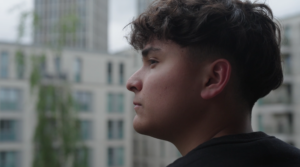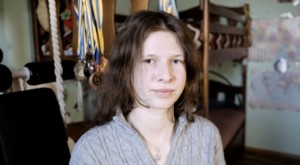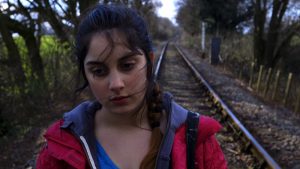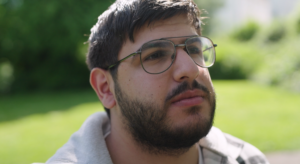Transcript
Refugee Stories: Rishan
Rishan: Hi, my name is Rishan. I'm 26 years old and I'm from Eritrea. My family fled Eritrea when I was three years old because it's owned by dictatorship president. You don't get the chance to your human basic rights. Everything is just restricted. Everything you have to go with by the government. You get to a certain point that you have to obviously cut off your education because you're going to be sent to military. Some families, mums, they don't know what their children happened to them, whether they died, whether they're still here, or whether even exists. My mum decided she doesn't want that to happen for me or my other siblings so she fled to Eritrea. I spent my life in Sudan 13 years. I've never been to school. I have my neighbour who is a teacher, who is the one teaching me how to read English and the mass and all of these things. We only had just one room. So that would be with me, with my mum and my siblings together. And it's a small thing, but it's kind of brings lots of memories, beautiful memories. My family didn't had any documentations. My mum always say to me, oh don't go out so much. If you don't have ID, you would be taken by the police force and then you can be sent back to your country. That's what happened to my dad. I never get to know where is he now.
I left Sudan when I was 16 years old, and that was the end of 2014. It was just a need for me to leave. There was no option for me to stay in Sudan. So therefore I have to just leave without telling my family or telling my my mum because otherwise she will stop me. It was just all of a sudden happen. And I was the oldest of my siblings. I felt the need for me that to to just move from Sudan. I left with my friends, three of us. It was a small car crossing the Sahara. The adrenaline of like continuously that I have to just keep going, keep going. And I couldn't look back and just decide that I. Oh, I'm not I can't do it. So let's let's go back to Sudan. So it was just, um, it's just there was a moment of continue moving from place to place and thus, um, started from Sudan and I went to Libya and then from Libya to crossing the Mediterranean Sea to Italy, and then from Italy to France, and then from France to Calais, from Calais to the UK. We always like in fear that we have to be like hidden. We have to be covered. They should, if they see a car that come in like crossing the border. So you have to be like always. The like, mind your head. Nothing is gonna gonna happen to you. We been placed in the house that there was no, like, any food or any water. And you don't get to see the sun. You just have to be kept inside with full of so many people there in one room. And you will hear the shooting, because there was always shooting guns there. And you just have to pray that this bullet doesn't come to your head. So many females being raped or being abused by males happening there. I think I was just lucky because I speak the language, so I understand what they saying. I would move from the place if something came across to me. Could be any like dangerous physically. To cross the Mediterranean Sea was in the small boats. Halfway to get to Italy. The boat starts sinking. I remember there's water and everyone trying to get this water outside. I start praying that, um, that something is gonna happen. Like, something is gonna be gonna come and just save us. Luckily, the Italian border came and then they just took us in the big ship. In Calais. I saw people like jumping at the back of the lorry and I tried couple time and I guess because of my size was small it was easy for me to enter inside and from there the lorry goes to the train and then the train obviously arrived to the UK and um, it was a, it was a daytime that when I came to here when the UK police found me. When I arrived here, I was 17 years old, so they decided to put me with a foster family. I was so exhausted. And I just want to, just to sleep. My fosters start to teach me, what's the pound what's the royal family, and all of these things started to know about the country. But it's more like in the back of my head, am I safe, is this really. I can trust those people, even though their approach is welcoming and supporting. Everything is just back. Came back from the beginning.
That's the reason I used to stay in my room. Just to kind of get this thing away from my head, but it was never did. So when I left was with other two friends. By the time I crossed the Mediterranean Sea to Italy. I asked about my friend, one of them. He didn't make it because their boat is just sunk in the sea. I felt like, why me and why him? And that's the the, the moment of like reflecting back about the journey. Like why did we already left from the very beginning and why I was lucky to be here and why this is happening to him. The journey was full of danger, full of terrifying moment. The thing that keeps me alive would be like my hope that God is going to be with me. I always say that from Sudan to the UK it was one journey. But living in the UK is my second journey. When I came here, the most shocking things that I felt like really sad and upset to the point that I was just, um, I said, why, why, why is that? All things that I've done it and nothing is going to be sorted out. And I guess not being with my family, it took me more like it kind of shocked me more when I came here. You cannot bring your family. You can't bring your siblings. I spent the time, a long time in my room because like I asked him, why did I left? And nothing is going to be happen with it. But my foster care took me on a positive journey. I would say to think about no Rishan. You can now think about what things you wanted to do in terms of education. How are you going to be supporting them by first supporting yourself? And I always say, I want to go to university. I want to do nursing, which is now what I'm doing. I'm in my final year of nursing. I definitely want to be a nurse to work in the NHS. I would say I like the word refugee. I like people to refer me as refugee. Anyone in their life. We seek refuge in something. Being a refugee and being always heard the word illegal, Illegal. I'm always looked up on a way of on a negative perspective. I'm here to seek safety. Nobody would like to die in a journey. Nobody would like to be separated from their family. The point that is just you don't have an option for plan A or B, you just have to leave. I know KRAN since I came here, I was a service user. Like I was just young person attending classes. There was a role of youth ambassador and that's where I apply for it. I feel like there's a platform for me in KRAN to advocate about this situation. I want to reach more people to talk about our story. This is my situation. This is my story. I'm proud to be like refugee because it's nothing wrong with being a refugee.








